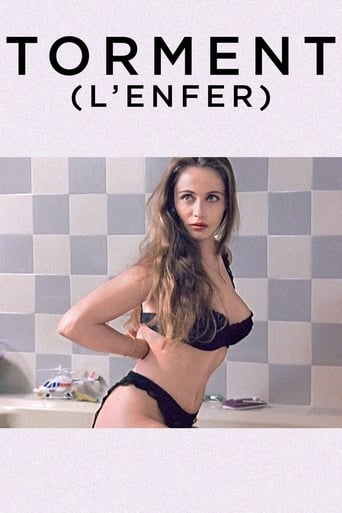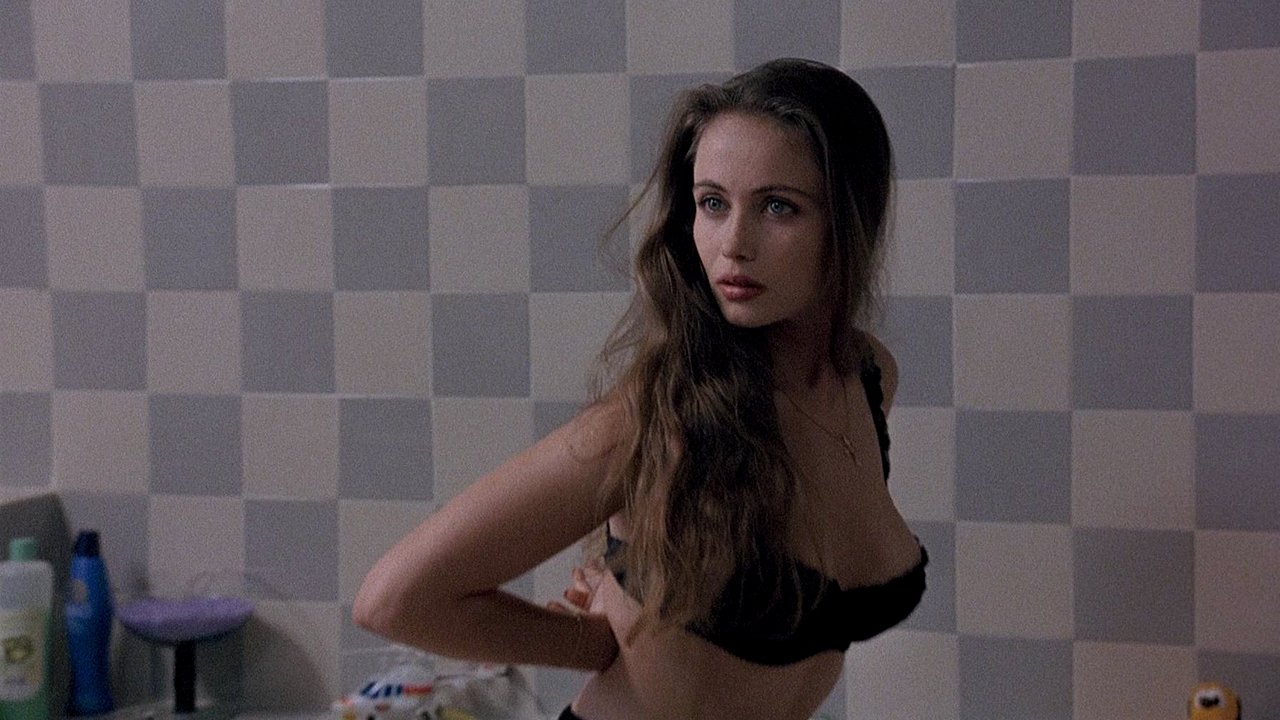MartinHafer
I just finished watching the stunning film L'Enfer and I couldn't wait to review it. The movie was written by one of my favorite French writers, Clouzot, so it was bound to be a good movie. Well, not exactly. In fact it was not just good but exceptional and is one of the better films I have seen in some time.With my background as a psychotherapist, I have to say that it was a brilliant psychological study of madness. All too often, films don't get it right--here, it's perfect.The story is about a jealous husband. At first, he shows signs of anxiety--trouble sleeping, irritability and distractability. Later, this slowly evolves to include paranoia, as he begins to suspect his lovely wife of infidelity. Well, at this point it MIGHT be that the husband is mildly mentally ill or perhaps he just has a very active imagination. However, very slowly the paranoia becomes more and more delusional and it's obvious this is no mild illness. In fact, it becomes increasingly obvious he is exhibiting strong symptoms of paranoid schizophrenia. However, his wife refuses to believe--thinking instead that he is just a jerk and not potentially dangerous. However, he ultimately becomes violent and accusatory--and the violence continues to escalate.So far, this is a magnificent portrait of mental illness, as this SLOWLY developed and evolved. Unfortunately, one inexplicable part of the movie keeps it from getting a score of 10. When he ultimately beats and rapes her, she goes to the doctor. When the husband is confronted by the doctor, the husband VERY QUICKLY and CONVINCINGLY decompensates. It is obvious to anyone with an IQ greater than 14 that he is VERY dangerous and MUST be hospitalized as soon as possible to protect himself and others. BUT, the doctor sends them home--to come back in the morning!!! While it is VERY clever of the doctor to convince the paranoid husband the it is the wife who will be hospitalized, I can't imagine any doctor not calling for an immediate ambulance or the police to apprehend and forcibly commit him.Despite this flaw, what happens next and the absolute uncertainty of the ending is remarkable--you really aren't sure exactly what happened because it is all shown through the eyes of the husband and his own reality ultimately disintegrates and he is uncertain exactly what has occurred. This blending of paranoid schizophrenia with signs of disorganized schizophrenia was brilliant, as some people diagnosed with paranoid schizophrenia later become MUCH more more fragmented and irrational. A WONDERFUL JOB BY THE WRITER, DIRECTOR and the MARVELOUS ACTOR PLAYING THE TROUBLED HUSBAND--WOW, what a great and convincing job! Too bad there was that little slip-up with the way the doctor behaved.
dbdumonteil
Among all the directors labelled "nouvelle vague",Claude Chabrol was arguably the one who had more affinities with the precedent generation so despised by a lot of his sixties colleagues.And the generation before Chabrol included the genius Henri-George Clouzot.So,to film "les diaboliques"'s director lost screenplay,Chabrol was ideal.Both he and Clouzot mix detective stories,social satire and psychological studies. "L'enfer" might be one of Chabrol's finest achievements.François Cluzet,in a lifetime performance,portrays a jealous man-recalling Bunuel's hero in "El'(1952)-,but his jealousy verges on madness.Little by little,with small touches,we see this maleficent obsession grow like a cancer,destroying everything,his wife's sincere love(well played by Emmanuelle Béart),his personality,his job.And see how Chabrol masters space.At the beginning,the action takes place in a wonderful lake setting.Then we do not get out of the hotel owned by Cluzet,with its dangerous corridors .And in the final sequences ,the director confines his two characters to a doctor office or their bedroom. Cluzet's madness and its inexorable progression are masterfully shown too.First,only some gestures,some voice inflexions.Then he begins to follow her everywhere .Then come the hallucinations:the amateur movie projected onto a small screen in the restaurant is the film's apex and should be part of a Chabrol anthology.Interior voices obsess the unfortunate hero,and every time he looks himself in a mirror,he sees an irrational world,this world he lives in,this world he believes in.No longer able to communicate with the normal one,he forces the other ones (his wife being first in line)to enter his.And we are not sure,at the end of the movie,that Béart is not on the other side of the mirror too.Two private jokes: In the first sequence,Béart puts her hair in braids,and she resembles Vera Clouzot in "les diaboliques".When the young couple comes back to the restaurant after the wedding,the little accordion tune "les couleurs du temps" that you hear was written by Guy Béart,Emmanuelle's father a long time ago.NB.Clouzot's version,which he began to film circa 1963,featured Romy Schneider and Serge Reggiani.(although the film was never completed,it has a page on IMDb)
Dennis Littrell
Although Emmanuelle Béart (Manon des sources (1986), Un coeur en hiver (1992), etc.) is particularly beautiful in this Claude Chabrol film and entirely compelling in the role of a free-spirited wife suspected of adultery, and even though her co-star Francois Cluzet (Une affaire de femmes (1988)) does a fine job as a man obsessed with jealousy, this turns out to be an almost boring movie.I think the problem is in the ambiguity about Nelly's infidelity that director and scriptwriter Chabrol relied on. Ambiguity by itself does not create tension. Artistic tension comes from an interplay within the mind of the viewer between an anticipated or expected result and its actual delineation. Thus in comedy we know that they will live happily ever after, and in tragedy, the fatal flaw will lead to something horrible. We can even know the end of the story, as in Shakespeare's Romeo and Juliet or in the Swedish film, Elvira Madigan (1967), or indeed in any number of war films, and still eagerly anticipate how it happens. In fact, I think it is always the case that we anticipate the end of a story at least in a general way: good will triumph over evil, the evil person will get his or her comeuppance, the British army will win the war, etc. In modern cinema this may not seem always true since the bad guys sometimes triumph, as in noire movies. Nonetheless I think the ending of such movies is really what we expect, the revelation of the essential unfairness of the world. It becomes then only a question of just how this unfairness manifests itself. As in classic drama, the modern comédie noire may be seen as a tragedy, with society or the meek or the slow or the trusting being devoured by the wild animals of the city.Regardless, here I think it might have been better to clearly reveal Nelly's infidelity or lack of it, early on, and then focus on its discovery or the revelation of a delusion. Obsessive jealousy is a theme that should work, but may be harder to put on film than Chabrol realized. I think too that the character of the irrationally jealous man be made manifest in some collateral way; perhaps we should see his insecurity before hand somehow; perhaps he should have some obvious shortcoming of appearance or character or there should be something from his past that leads him to irrational jealousy. Clearly an older man with a young and beautiful wife may be jealous in anticipation of the inevitable; or any man with a flirtatious wife. This is not necessarily irrational. Béart's Nelly reminds me of Brigitte Bardot from the days of her youth as in And God Created Woman (1957), a naturally warm and sensuous being, full of affection for others, very beautiful and impossibly sexy. The way Nelly walks and swings herself owes something to Bardot. The psychology of the Roger Vadim film from the fifties advanced the controversial) argument that a woman like that needs a firm hand. Here the suggestion is that the husband's jealousy can only lead to pain and disaster, and that the only hope is complete trust.What I am trying to say is that the psychology, like the tension of the film, seemed at loose ends. It is clear before we are halfway through that Nelly really loves her husband, the real question being, is he enough for her? I also think that Nelly's character should have included something negative in it (she seems a little too good to be true), something the viewer could relate to, perhaps a past infidelity or betrayal.Charbol is a better director than this film might indicate. See the aforementioned Une affaire de femmes (1988) starring Isabelle Huppert as an example of what he can do.(Note: Over 500 of my movie reviews are now available in my book "Cut to the Chaise Lounge or I Can't Believe I Swallowed the Remote!" Get it at Amazon!)
chabrol
full of "suspence" without use any special effects, a Franz Kafka's plot. You cannot understand if this torment is true or only a paranoia... Chabrol strikes again! Merci!


 AD
AD

